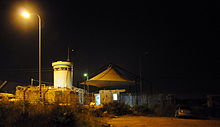Azzun Atma
Template:Infobox Palestinian Authority muni 'Azzun 'Atma (Template:Lang-ar) is a Palestinian village in the Qalqilya Governorate in the western West Bank, located 5 kilometers South-east of Qalqilya. According to the Palestinian Central Bureau of Statistics, 'Azzun 'Atma had a population of approximately 1,670 inhabitants in mid-year 2006.[1] 3.9% of the population of 'Azzun 'Atma were refugees in 1997.[2] The healthcare facilities for 'Azzun 'Atma are designated as MOH level 2.[3]
History
Potsherds from the Iron Age II, Persian, Hellenistic, Byzantine, Byzantine/Umayyad, Crusader/Ayyubid and Mamluk eras have been found.[4] Old stones have been reused in homes, and the mosque is possibly an old church.[5]
Ottoman era

The place appeared in 1596 Ottoman tax registers as 'Azzun, being in the Nahiya of Jabal Qubal of the Liwa of Nablus. It had a population of 29 households and 2 bachelors, all Muslim. The villagers paid taxes on wheat, barley, summercrops, olives, goats and beehives.[6]
When the French explorer Victor Guérin visited the place in 1870 it was described it as a large Arab village, then deserted. Many small, square houses were still partly standing, and near the mosque he noticed old columns and large stone from older buildings. Old fig trees and beautiful mimosa were scattered through the ruins.[7] In the Palestine Exploration Fund's Survey of Western Palestine (1882), it is also described as a "ruined village".[8]
See also
Footnotes
- ^ Projected Mid -Year Population for Qalqilya Governorate by Locality 2004- 2006 Palestinian Central Bureau of Statistics.
- ^ Palestinian Population by Locality and Refugee Status Palestinian Central Bureau of Statistics
- ^ Health care Facilities West Bank[permanent dead link]
- ^ Finkelstein et al., 1997, p. 290
- ^ Dauphin, 1998, p. 808
- ^ Hütteroth and Abdulfattah, 1977, p. 135
- ^ Guérin, 1875, pp. 143-144
- ^ Conder and Kitchener, 1882, SWP II, p. 305
Bibliography
- Conder, Claude Reignier; Kitchener, H. H. (1881). The Survey of Western Palestine: Memoirs of the Topography, Orography, Hydrography, and Archaeology. Vol. 2. London: Committee of the Palestine Exploration Fund.
- Dauphin, Claudine (1998). La Palestine byzantine, Peuplement et Populations. BAR International Series 726 (in French). Vol. III : Catalogue. Oxford: Archeopress.
- Finkelstein, Israel; Lederman, Zvi, eds. (1997). Highlands of many cultures. Tel Aviv: Institute of Archaeology of Tel Aviv University Publications Section. ISBN 965-440-007-3.
- Guérin, Victor (1875). Description Géographique Historique et Archéologique de la Palestine (in French). Vol. 2: Samarie, pt. 2. Paris: L'Imprimerie Nationale.
- Hütteroth, Wolf-Dieter; Abdulfattah, Kamal (1977). Historical Geography of Palestine, Transjordan and Southern Syria in the Late 16th Century. Erlanger Geographische Arbeiten, Sonderband 5. Erlangen, Germany: Vorstand der Fränkischen Geographischen Gesellschaft. ISBN 3-920405-41-2.
- Palmer, E. H. (1881). The Survey of Western Palestine: Arabic and English Name Lists Collected During the Survey by Lieutenants Conder and Kitchener, R. E. Transliterated and Explained by E.H. Palmer. Committee of the Palestine Exploration Fund.
External links
- Survey of Western Palestine, Map 14: IAA, Wikimedia commons
- ‘Azzun ‘Atma Village (Fact Sheet), ARIJ
- ‘Azzun ‘Atma Village Profile, ARIJ
- ‘Azzun ‘Atma, aerial photo, ARIJ
- Development Priorities and Needs in ‘Azzun ‘Atma, ARIJ
- Azzun- Atma: A village encircled by the Wall 17, May, 2004, ARIJ
- Israeli Occupation Forces Expands its Siege on Residents of Azzun Atma – Qalqiliya Governorate[permanent dead link] 16, May, 2006, ARIJ
- New Stage for completing the Segregation wall around 'Azzun 'Atma village in Qalqilyia, 02, October, 2006, ARIJ
- Azzun Atme village engulfed by two walls[permanent dead link] 05, November, 2007, ARIJ
- Azzun Atmeh village completely sealed off by the Segregation Wall 01, March, 2009, ARIJ
- Settlers of the Israeli Settlement of "Oranit" Set Lands of 'Azzun 'Atma village Ablaze[permanent dead link] 09, November, 2009, ARIJ
- Israeli Colonists Pump Sewage towards a Palestinian School in 'Azzun 'Atma village[permanent dead link] 23, February, 2010, ARIJ
- Azzun Atma Wall Section - Qalqiliya Governorate[permanent dead link] 06, December, 2011, ARIJ

